Life Sciences News
See our Latest Journal Publications
‘Lost’ 99% of ocean microplastics to be identified with dye?
 The smallest microplastics in our oceans – which go largely undetected and are potentially harmful – could be more effectively identified using an innovative and inexpensive new method, developed by researchers at the University of Warwick.
The smallest microplastics in our oceans – which go largely undetected and are potentially harmful – could be more effectively identified using an innovative and inexpensive new method, developed by researchers at the University of Warwick.
New research, led by Gabriel Erni-Cassola and Dr. Joseph A. Christie-Oleza from Warwick’s School of Life Sciences, has established a pioneering way to detect the smaller fraction of microplastics – many as small as 20 micrometres (comparable to the width of a human hair or wool fibre) - using a fluorescent dye.
Colon cancer breakthrough could lead to prevention
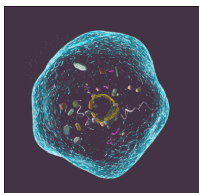 Colon cancer, Crohn’s, and other diseases of the gut could be better treated – or even prevented – thanks to a new link between inflammation and a common cellular process, established by Dr Ioannis Nezis and colleagues.
Colon cancer, Crohn’s, and other diseases of the gut could be better treated – or even prevented – thanks to a new link between inflammation and a common cellular process, established by Dr Ioannis Nezis and colleagues.
Crops evolving ten millennia before experts thought
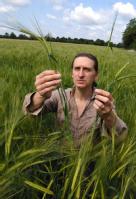 Ancient hunter-gatherers began to systemically affect the evolution of crops up to thirty thousand years ago – around ten millennia before experts previously thought – according to new research by Professor Robin Allaby.
Ancient hunter-gatherers began to systemically affect the evolution of crops up to thirty thousand years ago – around ten millennia before experts previously thought – according to new research by Professor Robin Allaby.
Read Press Release
VirionHealth Raises Series A Funding from Abingworth
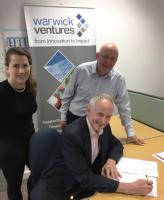 VirionHealth Ltd, a new biotechnology company developing novel therapeutics for respiratory viral infections, today announced that it has raised up to £13 million in Series A funding from Abingworth, the international investment group dedicated to life sciences.
VirionHealth Ltd, a new biotechnology company developing novel therapeutics for respiratory viral infections, today announced that it has raised up to £13 million in Series A funding from Abingworth, the international investment group dedicated to life sciences.
VirionHealth, founded on pioneering research by Professors Nigel Dimmock and Andrew Easton at the University of Warwick’s School of Life Sciences, is a world leader in the development of precisely engineered, non-infectious, defective interfering particles. This new class of biological antiviral acts by outcompeting replication of infectious viruses to both prevent and treat viral infections.
(Image: Laura Lane from Warwick Ventures, Professor Andrew Easton and Professor Nigel Dimmock on day of signing)
Brain cells that control appetite identified for first time
 Dieting could be revolutionised, thanks to the ground-breaking discovery of the key brain cells which control our appetite. Professor Nicholas Dale in the School of Life Sciences has identified for the first time that tanycytes – cells found in part of the brain that controls energy levels – detect nutrients in food and tell the brain directly about the food we have eaten.
Dieting could be revolutionised, thanks to the ground-breaking discovery of the key brain cells which control our appetite. Professor Nicholas Dale in the School of Life Sciences has identified for the first time that tanycytes – cells found in part of the brain that controls energy levels – detect nutrients in food and tell the brain directly about the food we have eaten.
Read Press Release
Antimicrobial resistance tackled with new £2.85m PhD Training Programme
 New scientists will be trained to explore ways to tackle antimicrobial resistance - one of the greatest emerging threats to human health – with the creation of a £2.85m national PhD Training Programme, funded by the Medical Research Council and part-led by the University of Warwick.
New scientists will be trained to explore ways to tackle antimicrobial resistance - one of the greatest emerging threats to human health – with the creation of a £2.85m national PhD Training Programme, funded by the Medical Research Council and part-led by the University of Warwick.
Professor Chris Dowson from Warwick’s School of Life Sciences is part of the Programme Leadership Team, and has been integrally involved with the establishment of the training programme.
Read Press Release
Cells programmed like computers to fight disease
 Cells can be programmed like a computer to fight cancer, influenza, and other serious conditions – thanks to a breakthrough in synthetic biology by the University of Warwick.
Cells can be programmed like a computer to fight cancer, influenza, and other serious conditions – thanks to a breakthrough in synthetic biology by the University of Warwick.
Led by Professor Alfonso Jaramillo in the School of Life Sciences, new research has discovered that a common molecule - ribonucleic acid (RNA), which is produced abundantly by humans, plants and animals - can be genetically engineered to allow scientists to program the actions of a cell.
Read Press Release
Asian hornet “adds to growing number of threats to honeybees” – Warwick research on BBC
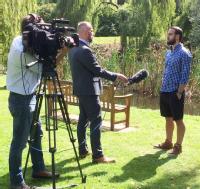 Research to help prevent the spread of Asian hornet across the UK - carried out by the University of Warwick - was recently featured on BBC Midlands Today and BBC Online.
Research to help prevent the spread of Asian hornet across the UK - carried out by the University of Warwick - was recently featured on BBC Midlands Today and BBC Online.
Led by the Warwick’s Zeeman Institute for Systems Biology & Infectious Disease Epidemiology Research (SBIDER), the recent study predicts that Asian hornet – a voracious predator of honey bees and other beneficial insects – could colonise the UK within two decades.
The BBC’s David Gregory-Kumar interviewed Dr Daniel Franklin at the School of Life Sciences.
Asian hornet to colonise UK within two decades without action
 The yellow legged or Asian hornet – a voracious predator of honey bees and other beneficial insects – could rapidly colonise the UK unless its spread is combatted, according to new research by the Universities of Warwick and Newcastle, working with the National Bee Unit.
The yellow legged or Asian hornet – a voracious predator of honey bees and other beneficial insects – could rapidly colonise the UK unless its spread is combatted, according to new research by the Universities of Warwick and Newcastle, working with the National Bee Unit.
Professor Matt Keeling, from Warwick’s Zeeman Institute for Systems Biology & Infectious Disease Epidemiology Research (SBIDER), predicts that if Asian hornet nests are left to thrive in the UK, there could be hundreds of thousands of them in just over two decades – putting a critical strain on British populations of honey bees and other beneficial insects.
GP-based testing for HIV is cost-effective and should be rolled out in 74 local authorities
 Offering HIV testing to people at health checks when they register at a new GP surgery in high-prevalence areas is cost-effective and will save lives.
Offering HIV testing to people at health checks when they register at a new GP surgery in high-prevalence areas is cost-effective and will save lives.
That’s according to a study, published in The Lancet HIV, involving over 86,000 people from 40 GP surgeries.
Using a mathematical model which was co-developed by Professor Deirdre Hollingsworth at the University of Warwick that includes all the costs associated with HIV testing and treatment, the team show that primary care HIV screening in high prevalence settings becomes cost-effective in 33 years (according to National Institute for Health and Care Excellence [NICE] criteria).
International Biology Olympiad hosted by Life Sciences
The International Biology Olympiad (IBO), which takes place every year in different locations across the globe, sees pre-university students compete in a series of practical experiments and theoretical exams in what is the biggest biology competition in the world.
The competition, which spans a week in duration, takes place from 23 - 30 July, and - after a successful bid back in 2012 - will be taking place this year in the United Kingdom at the University of Warwick's School of Life Sciences.
Multi-million-pound investment in a regional cryo-electron microscopy facility
A state-of-the-art Midlands regional cryo-electron microscopy (Cryo-EM) facility has been established, following a successful bid by the Universities of Warwick, Nottingham and Birmingham, led by the University of Leicester.
The total investment exceeds £6M, with £3.7M from the Medical Research Council. The four partner Universities will provide the remaining funds, with the University of Warwick contributing £460,000.
The co-applicants of the project from Warwick were Dr Corinne Smith from the School of Life Sciences, with Professors Mohan Balasubramanian and Rob Cross from Warwick Medical School.
As part of the investment, a new 200KV cryo transmission electron microscope will be placed in the Advanced Bioimaging Research Technology Platform, located within Warwick’s School of Life Sciences.
Bacteria collaborate to propel the ocean ‘engine’
 Essential microbiological interactions that keep our oceans stable have been fully revealed for the first time, by researchers at the University of Warwick.
Essential microbiological interactions that keep our oceans stable have been fully revealed for the first time, by researchers at the University of Warwick.
Dr Joseph Christie-Oleza and Professor David Scanlan from the School of Life Sciences have discovered that two of the most abundant types of microorganism in the oceans – phototrophic and heterotrophic bacteria – collaborate to cycle nutrients, consequently, drawing carbon from the atmosphere and feeding the ecosystem.
Read Press Release
Professor Laura Green awarded OBE
 Congratulations to Professor Laura Green, Head of the School of Life Sciences at Warwick, who has been awarded an OBE in the Queen's Birthday Honours List 2017.
Congratulations to Professor Laura Green, Head of the School of Life Sciences at Warwick, who has been awarded an OBE in the Queen's Birthday Honours List 2017.
The award is in recognition of services to the health and welfare of farmed livestock.
Read Press Release
University of Warwick study to help understanding of childhood epilepsy
 A University of Warwick study to understand a form of epilepsy that affects children has received a grant from the charity Epilepsy Research UK. The research focuses on absence epilepsy which is largely a childhood condition which is characterised by sudden, brief interruptions of consciousness.
A University of Warwick study to understand a form of epilepsy that affects children has received a grant from the charity Epilepsy Research UK. The research focuses on absence epilepsy which is largely a childhood condition which is characterised by sudden, brief interruptions of consciousness.
In severe cases there may be more than 200 of these episodes each day, and these can be accompanied by or develop into convulsive seizures. Many children with absence seizures don’t respond to existing antiepileptic medication, which can present numerous difficulties in daily life, particularly with schooling.
Dr Mark Wall, Associate Professor in the School of Life Sciences, is leading the research. He said: “Our work will hopefully identify a new therapeutic target to treat absence epilepsy and increase understanding of the disease. The findings from this project will give important new information about how absence seizures arise, and may reveal new targets for the development of more promising treatments. The methods used will also be useful for the screening process of anti-absence seizure drugs in the future.”
Read Press Release
University of Warwick ranked eighth in the UK by the Guardian University Guide with Life Sciences listed in top 5 departments for biosciences
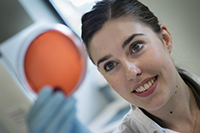 The University of Warwick has once again been ranked top ten in the latest UK university league table with Biosciences (Life Sciences) listed in the top five in the UK.
The University of Warwick has once again been ranked top ten in the latest UK university league table with Biosciences (Life Sciences) listed in the top five in the UK.
Read Press Release
Ebola: lives to be saved with new management approach
Ebola outbreaks are set to be managed quickly and efficiently – saving lives – with a new approach developed by an international team of researchers, including the University of Warwick, which helps to streamline outbreak decision-making.
Dr Michael Tildesley from the School of Life Sciences - with researchers from Penn State University in the USA – have discovered that educating people in areas affected by Ebola about how the disease spreads through communities is the most effective strategy for halting an epidemic.
Head of Life Sciences shortlisted for BBSRC Innovation Award
 Professor Laura Green, Head of the School of Life Sciences at the University of Warwick, has been shortlisted for an Innovator of the Year award from the Biotechnology and Biological Sciences Research Council (BBSRC).
Professor Laura Green, Head of the School of Life Sciences at the University of Warwick, has been shortlisted for an Innovator of the Year award from the Biotechnology and Biological Sciences Research Council (BBSRC).
Nominated in the ‘Social Impact’ category, Professor Green’s research has led to halving the level of lameness in sheep flocks - from ten percent to five percent - in a decade, saving a million sheep a year from becoming lame.
Bill Gates praises University of Warwick’s impact in fight against Neglected Tropical Diseases
Speaking at the Geneva summit on Neglected Tropical Diseases (NTDs), Bill Gates, co-Chair of the Bill & Melinda Gates Foundation, today applauded the efforts of UK scientists in protecting the world’s poorest people from NTDs: “UK aid and Britain’s world-leading research institutions like the University of Warwick are playing a major role in protecting the world’s poorest people from Neglected Tropical Diseases and enabling them to live healthier, more prosperous lives.”
The University of Warwick’s research, which is part-funded by the Bill & Melinda Gates Foundation, focuses on providing quantitative data on the prevalence of NTDs and the impact of the intervention programmes designed to combat them.
Dr Deirdre Hollingsworth, Associate Professor in Epidemiology at the University of Warwick, said: “We’re delighted to be part of the international effort to rid the world of these terrible diseases. Over the last two years we have made significant progress in understanding how these diseases spread, measuring the impact of eradication efforts and highlighting areas where additional interventions will be required to achieve our 2020 goals. We're optimistic that, with continued coordination and investment, we can protect more of the world’s poorest communities from NTDs.”
Read the Press Release
Professor Laura Green appointed to new Science Council
 The Food Standards Agency has announced that Professor Laura Green is to be a member of its new Science Council. The Council will provide high-level, expert and independent advice and challenge to the Agency on how it uses science to underpin its work.
The Food Standards Agency has announced that Professor Laura Green is to be a member of its new Science Council. The Council will provide high-level, expert and independent advice and challenge to the Agency on how it uses science to underpin its work.
